Smooth Solomon’s Seal
- October 10, 2023
- 0 comment
Certainly! “Smooth Solomon’s Seal,” scientifically known as Polygonatum biflorum, is a graceful and enchanting perennial plant native to North America. This woodland beauty is characterized by its arching stems adorned with pairs of delicate, oval-shaped leaves that cascade down in a ladder-like fashion, creating an elegant and airy appearance. In late spring to early summer, it produces pendulous, bell-shaped, greenish-white flowers that dangle beneath the arching stems, adding a touch of ethereal charm to shaded woodland gardens.
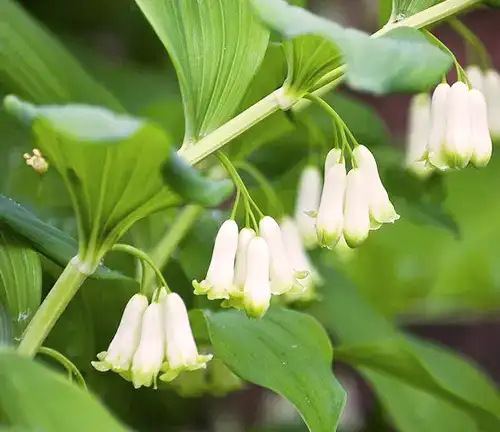
As the name suggests, the leaves of Smooth Solomon’s Seal are smooth and lack the hairs or roughness found in some related species. Beyond its aesthetic appeal, this plant also offers ecological benefits, serving as a valuable food source for various wildlife, including birds and insects. Gardeners and nature enthusiasts alike appreciate Smooth Solomon’s Seal for its ability to thrive in shaded areas, making it an excellent choice for creating serene and natural-looking landscapes. Its graceful demeanor and adaptability make it a cherished addition to gardens throughout its native range and beyond.
| Characteristics | Description |
| Scientific Name | Polygonatum biflorum |
| Common Name | Smooth Solomon’s Seal |
| Plant Type | Perennial |
| Native Range | North America |
| Foliage | Arching stems with pairs of oval-shaped, smooth-textured leaves |
| Flowers | Bell-shaped, greenish-white flowers |
| Bloom Time | Late spring to early summer |
| Habitat | Woodlands, shaded areas |
| Wildlife Value | Provides food for birds and insects |
| Growth Height | Typically reaches 2 to 3 feet (60-90 cm) |
| Sun Exposure | Partial to full shade |
| Soil Requirements | Moist, well-draining soil |
| Hardiness Zones | USDA Zones 3-8 |
| Landscape Use | Woodland gardens, shaded borders, naturalistic landscapes |
| Special Features | Graceful arching stems create an elegant appearance |
| Maintenance | Low maintenance; can form attractive colonies over time |
| Propagation | Division of rhizomes in spring or fall |
| Cultural Notes | Protect from strong winds, as the arching stems can be delicate |
Botanical Beauty of Smooth Solomon’s Seal
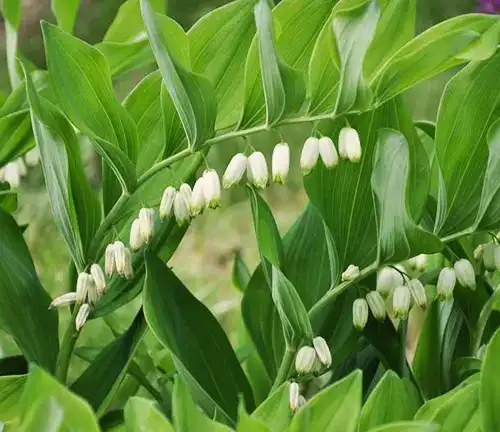
Smooth Solomon’s Seal, known scientifically as Polygonatum biflorum, is a botanical gem that graces woodlands across North America with its elegant presence. This perennial plant captivates all who encounter it, thanks to its unique appearance and enchanting attributes.
Woodland Elegance
One of the hallmark features of Smooth Solomon’s Seal is its graceful demeanor. Its arching stems, adorned with pairs of smooth-textured, oval-shaped leaves, create a delicate, laddered effect that adds an air of sophistication to shaded woodland environments. The plant’s name, “Solomon’s Seal,” derives from the scar-like marks that appear on the rhizomes once the stems die back in the winter, resembling the ancient seal of King Solomon.
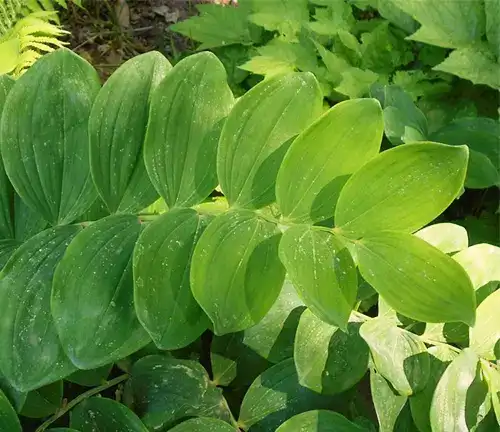
Ecological Importance
Beyond its aesthetic appeal, Smooth Solomon’s Seal plays a vital role in supporting local ecosystems. Its greenish-white, pendulous flowers, which bloom from late spring to early summer, provide a valuable food source for various wildlife, including birds and insects. As these creatures feed on the nectar and pollen, they help pollinate other plants in the vicinity, contributing to the overall health of the ecosystem.

Cultivation and Conservation
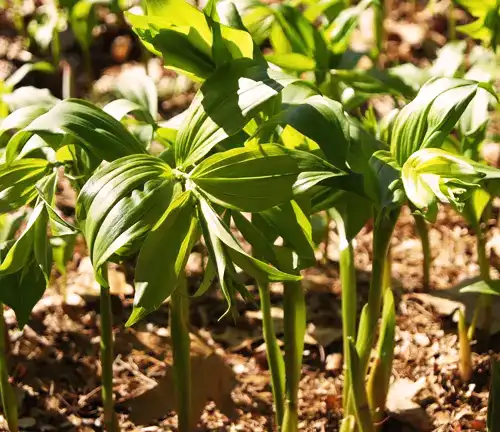
Smooth Solomon’s Seal is a hardy plant that thrives in partial to full shade, making it an ideal choice for shaded gardens and woodland landscapes. It prefers moist, well-draining soil and is well-suited to USDA Hardiness Zones 3-8. While it is relatively low-maintenance, it can form attractive colonies over time, enhancing the natural beauty of its surroundings. However, as with many native plants, conservation efforts are essential to protect this species from habitat loss and over-harvesting.
Fragrance
While the scent of Smooth Solomon’s Seal may not be as showy as some other flowering plants, its subtle fragrance adds to the overall woodland experience. A gentle, earthy scent wafts from the flowers, creating a serene and soothing atmosphere for those who take the time to savor it.
Soil Stabilization
One of the unsung heroes of Smooth Solomon’s Seal is its role in soil stabilization. Its extensive root system helps prevent erosion in woodland areas, making it an essential component of the ecosystem’s health. This contribution underscores its importance not just for its beauty but also for its ecological function.
Common Uses
Smooth Solomon’s Seal is a popular choice for woodland gardens, shaded borders, and naturalistic landscapes. Its elegant appearance and adaptability make it a cherished addition to gardens throughout its native range and beyond. Whether used as a standalone feature or as part of a diverse plant palette, it brings a touch of woodland magic to any setting.
Benefits
In summary, Smooth Solomon’s Seal is a botanical wonder that combines beauty, ecological significance, and practicality. Its elegant appearance enhances woodland landscapes, while its role as a food source and soil stabilizer underscores its importance in nature. Gardeners and nature enthusiasts alike can appreciate the charm and benefits of this remarkable plant, making it a timeless favorite in the world of native flora.
Different Species
Polygonatum biflorum
This is the most common species known as Smooth Solomon’s Seal, and it is native to North America. It features arching stems with pairs of smooth leaves and greenish-white, bell-shaped flowers.
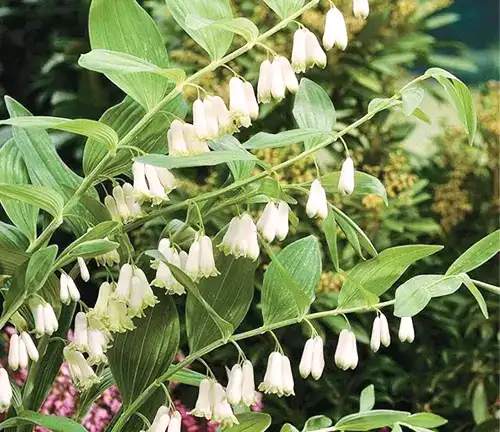
Polygonatum odoratum
Also known as Fragrant Solomon’s Seal, this species is native to Europe and Asia. It is highly prized for its sweetly scented, pendulous white flowers and is often cultivated for its ornamental value.
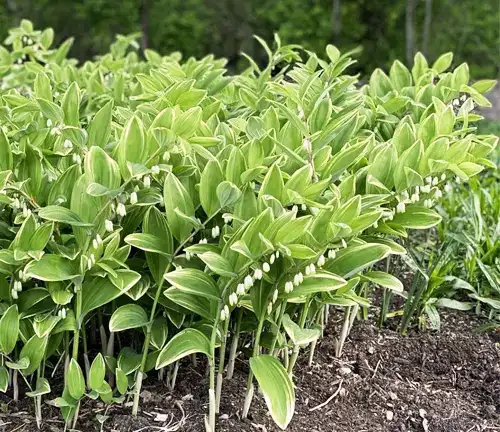
Polygonatum pubescens
Native to eastern North America, this species is commonly called Hairy Solomon’s Seal. It gets its name from the fine hairs that can be found on the undersides of its leaves and stems, distinguishing it from the smooth-leaved varieties.
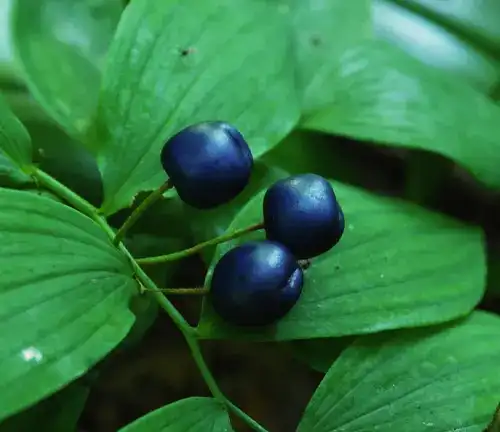
Polygonatum falcatum
This species, native to Asia, is commonly referred to as Angular Solomon’s Seal. It is known for its distinctive, slightly angled stems and delicate white flowers.
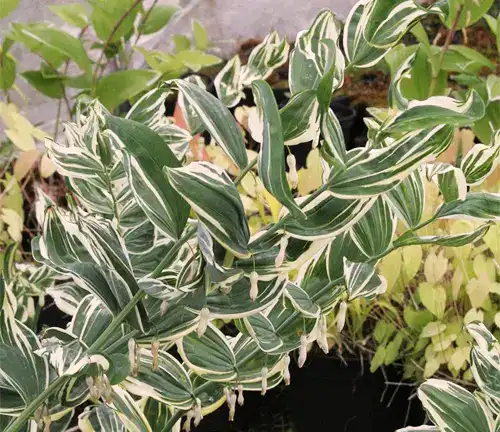
Polygonatum kingianum
Also known as King Solomon’s Seal, this species is native to China. It is celebrated for its striking purple-black berries that follow the flowering season, adding a touch of unusual color to the garden.
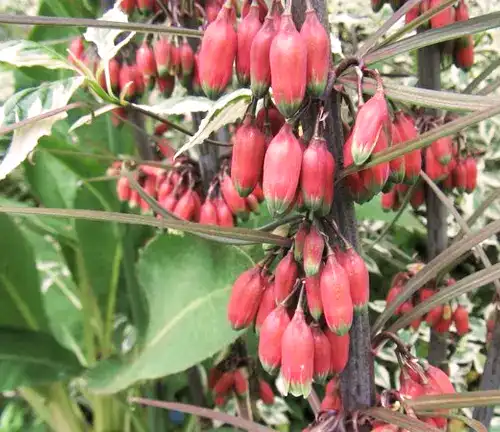
Polygonatum humile
Native to the Himalayan region, this species is called Dwarf Solomon’s Seal. It is characterized by its shorter stature and smaller, delicate white flowers.
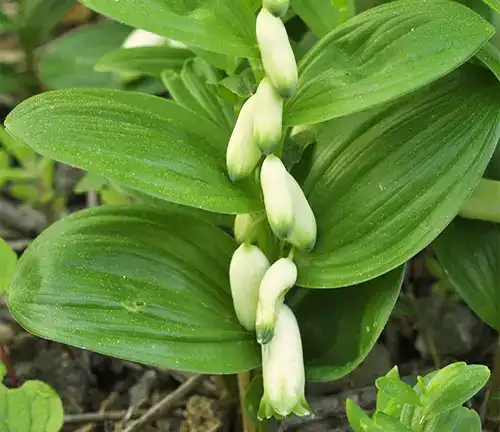
Polygonatum involucratum
Native to Japan, this species is known as Korean Solomon’s Seal. It features attractive, pendulous flowers surrounded by green bracts that give it a distinctive appearance.
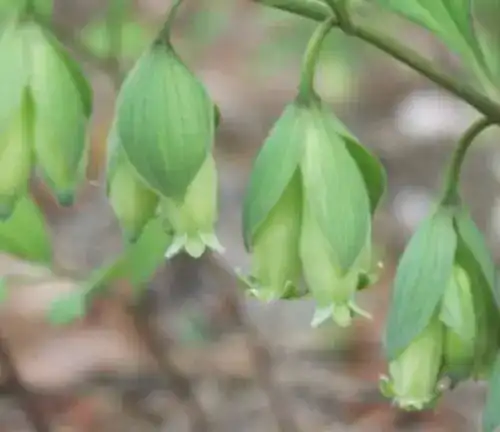
Frequently Asked Questions (FAQs)
- What is Smooth Solomon’s Seal, and where is it found?
Smooth Solomon’s Seal (Polygonatum biflorum) is a perennial plant native to North America. It is often found in woodlands and shaded areas. - How does Smooth Solomon’s Seal get its name?
The plant gets its name from the scar-like marks that appear on the rhizomes once the stems die back in the winter, which are said to resemble the ancient seal of King Solomon. - What does Smooth Solomon’s Seal look like?
It has arching stems with pairs of smooth, oval-shaped leaves and greenish-white, bell-shaped flowers that dangle beneath the stems. - When does Smooth Solomon’s Seal bloom?
It typically blooms in late spring to early summer, adding a touch of elegance to shaded gardens. - Is Smooth Solomon’s Seal fragrant?
While not strongly scented, it does emit a subtle, earthy fragrance from its flowers. - What are the ecological benefits of Smooth Solomon’s Seal?
Smooth Solomon’s Seal provides food for birds and insects through its nectar and pollen, contributing to local ecosystems. - Can Smooth Solomon’s Seal be grown in gardens?
Yes, it is a popular choice for woodland gardens, shaded borders, and naturalistic landscapes due to its adaptability and elegant appearance. - How do I care for Smooth Solomon’s Seal in my garden?
Plant it in partial to full shade, ensure well-draining soil, and provide regular moisture. It is relatively low-maintenance and can form colonies over time. - Is Smooth Solomon’s Seal endangered or protected?
While it may be protected in some regions, its conservation status varies. Efforts are made to protect native populations, as habitat loss can threaten its existence. - Can I propagate Smooth Solomon’s Seal in my garden?
Yes, it can be propagated through division of its rhizomes in spring or fall.

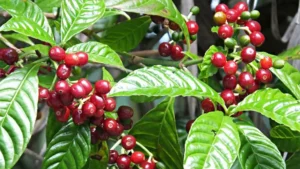
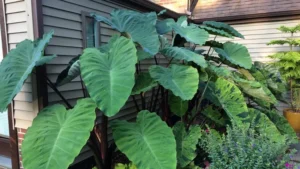
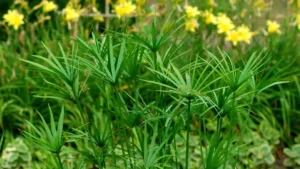
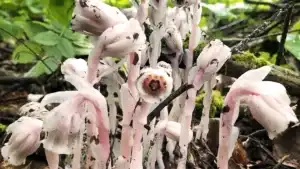
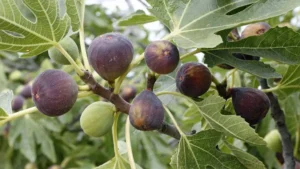
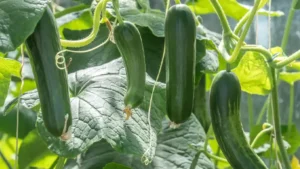
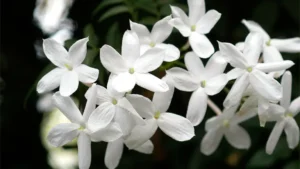
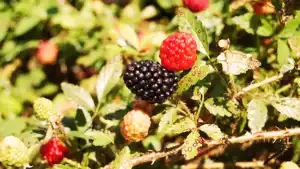
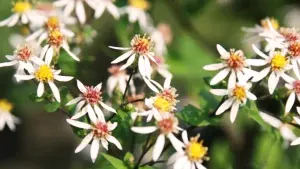
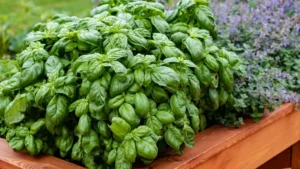


Leave your comment